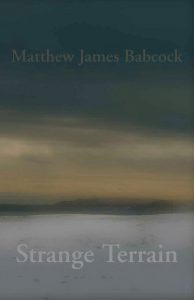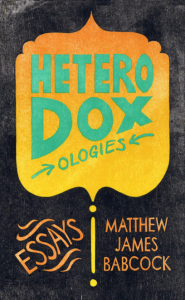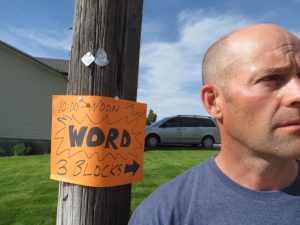Matthew James Babcock is the recipient of the 2016 AML Poetry Award for his collection Strange Terrain (Mad Hat Press, 2016). He is interviewed here by Dayna Patterson, who runs the Psaltery & Lyre poetry website.
DP: Can you talk about the title of your collection, Strange Terrain, and how you arrived at it?
MJB: The title comes from a line in the poem “Five Laotians.” It has no special meaning, but I liked the way the words went together, and I liked the way they described the collection as a whole: a ramble through some strange psychological, emotional, visual, and textual switchbacks and sloughs. The book is a bit form, a bit formless, more unformed than formed, and so given its harum-scarum approach to a kind of evolutionary, organic poetics, I thought I’d call it that. It’s a weird book, in the same way some landscapes in the Rocky Mountain Northwest are weirdly beautiful, and don’t seem to go together until you stare long enough to see they do.
DP: Why the almost restless experimentation with form? What drives you to attempt new forms in a poetic age that largely eschews formalism?
MJB: One luxury of being a writer of no consequence is that you can ignore editorial bias. You can eschew those who choose to eschew you. Such stylistic stoicism, however, has its cost, as it’s taken me a quarter century to bring out this book. Twenty-five years ago, I didn’t know two things: 1. that it would take twenty-five years to write this book, and 2. that I was writing a book. In my twenties, I think, I was just sounding off my pop-gun of poems, trying prose, trying forms, trying anything to figure out what kind of writer I was. In my late forties now, I’m not sure I’ve figured that out. That “restless life unchanged” in “Cherry Tomatoes: A Rhapsody” is most certainly mine.
DP: Twenty-five years. Congratulations for being so persistent!
Exploring the idea of form a bit more, I’m thinking of May Swenson when she said: “The best poetry has its roots in the subconscious to a great degree. Youth, naivety, reliance on instinct more than learning and method, a sense of freedom and play, even trust in randomness, is necessary to the making of a poem.” How do you manage to infuse spontaneity into formal verse, such as in your playful “Sextina” and “Sunnet”?
 MJB: I agree that the subconscious is the poet’s fertility rite. Turning off the brain is the way to turn on the poem. I am weary of the present age of poetry we’re in: pseudo-intellectual, painfully arcane, religiously stripped of sentiment, music, swing, lyricism, playfulness. I just did a reading from Strange Terrain for college students, and I asked them, “Tell me what you think when I say ‘poetry reading.'” Hands went up: “pretentious,” “boring,” “elitist,” “confusing.” Those were my attitudes in college, too, and I think I’ve carried that vision through my own writing, trying to say something to poets but also to people who aren’t poets. Trying to have a bit of a chuckle with a well-known form, but also to remain understandable to most. I read a lot of pseudo-academic poetry, mostly because that’s what I encounter in some of the nation’s “top journals,” and I guess it instinctively makes me want to swing the other way. Even a very serious, tragic poem can be fun to write.
MJB: I agree that the subconscious is the poet’s fertility rite. Turning off the brain is the way to turn on the poem. I am weary of the present age of poetry we’re in: pseudo-intellectual, painfully arcane, religiously stripped of sentiment, music, swing, lyricism, playfulness. I just did a reading from Strange Terrain for college students, and I asked them, “Tell me what you think when I say ‘poetry reading.'” Hands went up: “pretentious,” “boring,” “elitist,” “confusing.” Those were my attitudes in college, too, and I think I’ve carried that vision through my own writing, trying to say something to poets but also to people who aren’t poets. Trying to have a bit of a chuckle with a well-known form, but also to remain understandable to most. I read a lot of pseudo-academic poetry, mostly because that’s what I encounter in some of the nation’s “top journals,” and I guess it instinctively makes me want to swing the other way. Even a very serious, tragic poem can be fun to write.
DP: How did you arrive at a poetics that involves such specifics of naming people, places, and things? What do you hope such pinpointing does for readers?
MJB: Takes them there. Poetry has always been the way to capture the quintessential American moment, a snapshot of the unsung. I like poetry’s portability, its portmanteau of particularities. Language is funny in that abstractions tend to encourage us to zone out, but specifics slap us awake. Orwell said something about being passionate about “the surface of the earth,” and I think that’s a passion I try to cultivate. And I believe it was Maxine Kumin who talked about encouraging her upstart writers to get a lot of “old furniture” in their poems. I remember reading that statement by Kumin and thinking that her observation made great practical sense for poetry.
DP: Do you have an insanely good memory for detailed names? Or do you keep a notebook of names, places, objects? What’s your method for capturing such specificity?
MJB: My wife tells me I have a good memory; it’s fading, I can feel it. But my habit of reading and writing has honed it, I think. I always have my pad/pen/pencil with me, and I’m always jotting things on napkins, hotel stationery, receipts. I think my habitual chicken scratching has made my experiences more permanent. Of course after twenty-five years of writing, I’m on the lookout now, armed and ready for a poem to raise its antlered head.
DP: Zooming out a bit here, how do you see Strange Terrain fitting into or building on the foundation of Mormon Poetics? American Poetics? What do you hope to add to the ongoing conversation about poetry in English?
MJB: I’m not sure about “Mormon Poetics,” not sure what it means, though I’ve been thrilled to be included in Fire in the Pasture, Irreantum, and to be given the AML Poetry Award. I’m far too far-flung to be considered any kind of writer adding his bricks to the foundation of American poetics. If anything, I hope my book will say to American poetry readers that readability can be a poetic virtue, and that the everyday—even the everyday suburban morning or evening—can startle you with the unexpected rapturous vision.
DP: Does the reading, writing, revising of poetry overlap for you with spiritual practice?
MJB: Yea, verily. What is revision but writerly repentance? How many sorrowful drafts of a poem can you be forgiven for: seventy times seven? God to me is a creative being, and I think Christians sometimes forget the creation is ongoing; not only a moment in religious history to marvel at, but a slipstream to step into. A poem is a little universe, unfolding before your eyes, and you are the creator and the witness. The greatest poems are rapturous, ecstatic, acts of submission and revelation. You take the chaos of words and shape something beautiful and as meaningful as you can let it be, and then you send it rolling through the cosmos of as many libraries as will take your work. You’re a wandering missionary bring the salvation of sentences. The only sin is not to write.
DP: “The only sin is not to write.” That’s beautiful.
I’m wondering about your poetic influences. Your verse seems to lean heavily into a compact soundscape. I’m thinking of Hopkins-esque lines like “Gutter floods babble muddy bedlam” from “Threnody for an Idaho Spring” or “A scrap of black plastic garbage sack / snagged on a music staff of barbed wire / flaps” from “Anniversary.” Can you speak to the influences undergirding your work, as well as its ensnaring music?
 MJB: I spent six years writing a book on minor American poet and Amherst resident Robert Francis. His poems were very spare, boiled down, nuggety, stripped of unnecessary words. He saw language as a precious resource, and not a word could be wasted. I’m sure that influenced me, although in some places, the longer prose pieces, I tend to go on, mostly because I’m trying to shake off influence and just make a moment fall into a poem. Influences are tricky because they beg comparison, but—Whitman, Dickinson, Stevens. Ferlinghetti, Hoagland, and that Maxine Kumin phase I think I’m still in. I’ve tried to read myself out of ruts, though. Peter Davis’s “Poetry, Poetry, Poetry” made me laugh right before Amy Newman’s “Dear Editor” made me stand open-mouthed in abject awe. And then thank creation for Lance Larsen, but I’ll never catch up with him.
MJB: I spent six years writing a book on minor American poet and Amherst resident Robert Francis. His poems were very spare, boiled down, nuggety, stripped of unnecessary words. He saw language as a precious resource, and not a word could be wasted. I’m sure that influenced me, although in some places, the longer prose pieces, I tend to go on, mostly because I’m trying to shake off influence and just make a moment fall into a poem. Influences are tricky because they beg comparison, but—Whitman, Dickinson, Stevens. Ferlinghetti, Hoagland, and that Maxine Kumin phase I think I’m still in. I’ve tried to read myself out of ruts, though. Peter Davis’s “Poetry, Poetry, Poetry” made me laugh right before Amy Newman’s “Dear Editor” made me stand open-mouthed in abject awe. And then thank creation for Lance Larsen, but I’ll never catch up with him.
DP: What creative projects are you working on now or next?
MJB: Well, this February I got to read from Strange Terrain with other Mad Hat poets at the United Methodist Church in D. C., just down the road from the White House. I was thrilled, of course, but I was surprised at how serious all my poems sounded coming out of my own mouth, and I resolved to go on a spiritual retreat into the satirical, to enter into some monastic orders of the absurd and slightly more upbeat. This next collection, I hope, will be funnier, even if it takes me twenty-five more years to write.
The Transient Rains of April
If nothing else, I have this: I once saved a girl’s life. Five years
back, before our son was born, I was walking a street that
had grown as familiar as your pulse. January. Twenty below.
Chestnut trees, stripped of their torches, hardened in the
fragile air. Crabapples blackened satchels of shriveled fruit. One
hundred and one mute crows whetted their feathers on the
bloodless sky. She wore frayed pajamas. Purple stripes. Her hair
bristled like the heart of winter. Her bare feet sloped down
driveway frost to the street. When she raised her arms to me, I
lifted the bundled cornstalks of her bones and took her to
the nearest house. You carry a stranger’s child the way you
would deliver a pillar of carved glass. The way you carry
the angel fresco dislodged from the cathedral arch of you
remaining days. I knocked on a screen door. An older girl
answered, examined us through the ragbag curtain of her bangs.
Her brown T-shirt bore a jaguar face with emerald eyes.
“That’s ours,” she said, pushing the door open. Then wump-
wump-wump-wump. The mother’s frantic stampede down
the stairs, her face an earthquake, and her arms gather the
loose laundry of her daughter’s soul to her breast. I walked
away, having learned something I would realize the day I stood
outside for the first time with our newborn son to taste the
glorious rain-gusts of spring: the faces of horror and ecstasy are
the same face. Later someone told me a black sickness had
stung the girl’s mother the previous October—stage four cancer
was the offhand report—and now her face is the only thing
I see, now that the earth has grown familiar as your pulse,
and I swing our baby boy in the deadly basket of my arms
under April’s unruly caravan of clouds, each boisterous plume a
mad crusade, the chill of fresh drops rallying blood in our
skin. I see the way she charged the threshold of her home,
snatched her golden hatchling from my outstretched arms,
and slammed the door as if I were not a hero but a terrible
disease.

